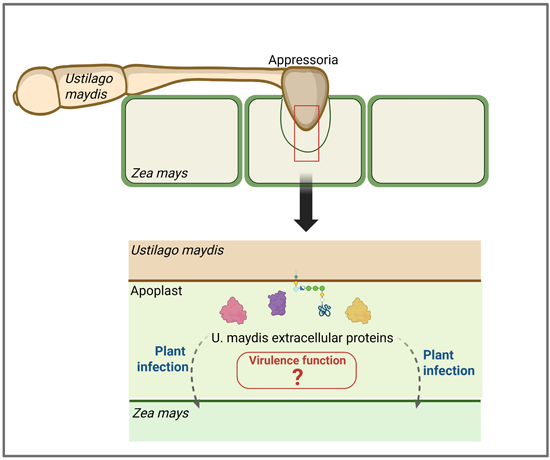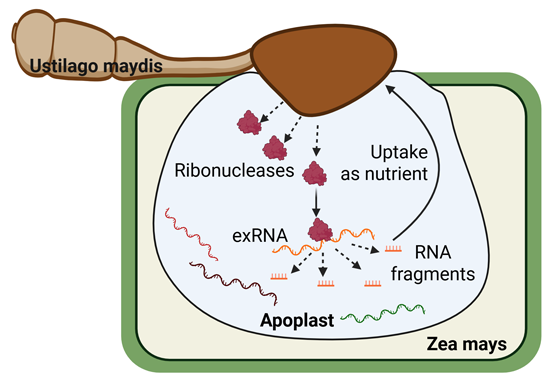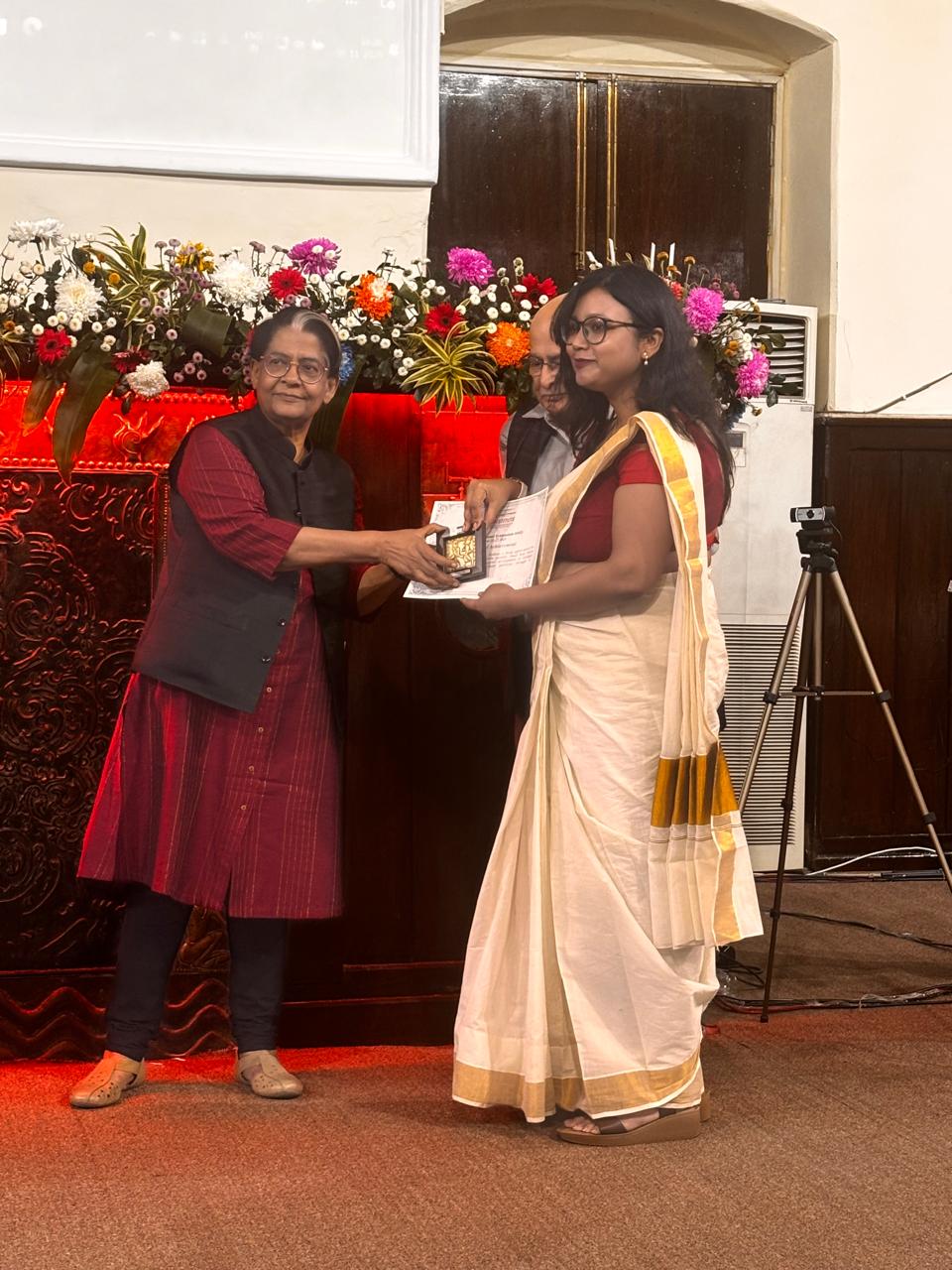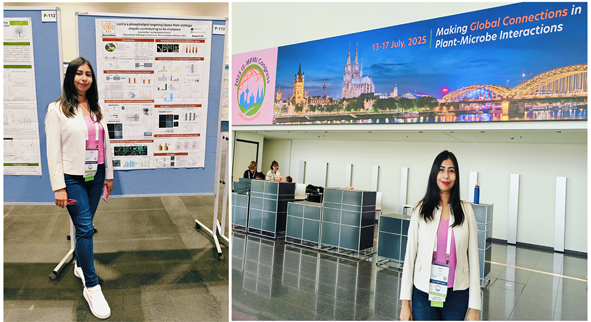
Anupama Ghosh
Associate Professor
Anupama Ghosh
Associate Professor, Biological Sciences
PhD: Saha Institute of Nuclear Physics / Calcutta University, 2010
Previous appointments:
Assistant Professor, Division of Plant Biology, Bose Institute, India
DST INSPIRE Faculty, Division of Plant Biology, Bose Institute, India
Post-Doctoral Research Fellow, Department of Organismic Interactions, Max Planck Institute for Terrestrial Microbiology, Germany
Research interests:
Plant microbe interactions
Pathogenic mechanisms of Ustilago
maydis
Fungal effector proteins
Beneficial interaction between host plants and root colonizing
rhizobacteria
Contact:
| Address: |
Biological Sciences Unified Academic Campus Bose Institute EN-80, Sector V Bidhan Nagar Kolkata - 700 091, India |
| E-Mail: | ghosh.anupama[at]jcbose.ac.in |
| Phone: | +91-33-25693245 |
Research:
Our group explores the many ways in which a biotrophic fungal pathogen, Ustilago maydis establish infection in its host plant Zea mays. Upon invasion a biotrophic interfacial space is created within the apoplast of the host plant that is surrounded by fungal cell wall and plant plasma membrane. One of the focus areas of our research involves understanding the virulence function of some of the fungal proteins that are secreted in this biotrophic interface and contribute to the pathogenicity of the fungus. · 
One such class of proteins that we are studying is the secreted fungal ribonucleases. We have demonstrated role of two T2 type ribonucleases Nuc1 and Nuc2 in the scavenging of extracellular RNA (exRNA) in maize apoplast as a nutrient source for the fungus. We are currently exploring the possibility of these ribonucleases to regulate exRNA mediated cell-cell communication during infection.

Another aspect of U. maydis Zea mays interaction that we are working on involves understanding
how small heat shock proteins contribute to the virulence mechanism of U. maydis. We have identified two small
heat shock proteins, Hsp12 and Hsp20 that exhibit functions beyond just
providing protection against proteotoxic stress. While Hsp12 functions as a membrane
chaperone, Hsp20 is involved in the regulation of key cellular processes that
together define the pathogenicity of U.
maydis. Currently we are investigating the mechanistic details of the
involvements of small Hsps in these processes.
Publications:
1. Mitra, A, Kar, A, Bhakta, K, Roy, A, Mukherjee, A, Ghosh, A, Ghosh, A. Small heat shock protein Hsp20 regulates multiple cellular pathways in Ustilago maydis through its interaction with cytoskeletal proteins. The FEBS Journal (Accepted)
2.Mondal, S, Acharya, U, Mukherjee, T, Bhattacharya, D, Ghosh, A, Ghosh, A. Exploring the
dynamics of ISR signaling in maize upon seed priming with plant growth
promoting actinobacteria isolated from tea rhizosphere of Darjeeling. Archives
of Microbiology 2024, Vol 206, 282, doi:10.1007/s00203-024-04016-1
3.
Mitra A, Bhakta K, Kar A, Roy A, Mohid Sk A, Ghosh A, Ghosh A*. Insight into the biochemical and cell
biological function of an intrinsically unstructured heat shock protein, Hsp12
of Ustilago maydis. Molecular Plant
Pathology 2023, doi: 10.1111/mpp.13350.
4. Mukherjee S,
Bhakta K, Ghosh A, Ghosh A*. Ger1 is a secreted aspartic acid
protease essential for spore germination in Ustilago maydis Yeast
2022, doi: 10.1002/yea.3835.
5. Acharya U, Das T, Ghosh Z and Ghosh A*. Defense surveillance system at the
interface: esponse of rice towards Rhizoctonia solani during
sheath blight infection. Molecular Plant Microbe Interactions, 2022, Vol
35(12), 1081-1095, doi: 10.1094/MPMI-07-22-0153-R.
6.Mukherjee D, Singh N P,
Roy A, Mondal R, Acharya U, Chattopadhyay D, Ghosh A*. The extracellular RNA pool within Zea mays
apoplast: composition and differential expression during Ustilago maydis infection. BioRxiv 2022, doi: 10.1101/2022.06.03.494492.
7. Roy M, Bhakta K, Bhowmick A, Gupta
S, Ghosh A, Ghosh A. Archaeal HSP14
drives substrate shuttling between small heat shock proteins and thermosome:
insights into a novel substrate transfer pathway. FEBS Journal 2022, Vol 289
(4), 1080-1104, doi: 10.1111/febs.16226.
Epub 2021 Oct 24.
8. Bhattacharya C, Banerjee S, Acharya
U, Mitra A, Mallick I, Haldar A, Haldar S, GhoshA,
Ghosh A. Evaluation of plant growth promotion
properties and induction of antioxidative defense mechanism by tea rhizobacteria
of Darjeeling, India. Scientific Reports 2020, Vol 10 (1),
1-19, doi: 10.1038/s41598-020-72439-z.
9. Mukherjee D, Gupta S,
GhoshA, Ghosh A*. Ustilago maydis
secreted T2 ribonucleases, Nuc1 and Nuc2 scavenge extracellular RNA. Cellular
Microbiology 2020, Vol 22 (12), doi: 10.1111/cmi.13256.
10. Mukherjee D, Mitra A, Ghosh A*. Detection of apoptosis like
cell death in Ustilago maydis by
Annexin V-FITC staining. Bioprotocol 2018, Vol 8 (15),
doi:10.21769/BioProtoc.2948.
11. Mukherjee D, Gupta S,
Saran N, Datta R, Ghosh A*. Induction of apoptosis-like cell
death and clearance of stress induced intracellular protein aggregates: dual
roles for Ustilago maydis metacaspase Mca1. Molecular Microbiology 2017, Sep
23, doi: 10.1111/mmi.13848.
12. Ghosh P, Roy A, Hess
D, Ghosh A, Das S. Deciphering the Mode of Action of a
Modified Allium sativum Leaf Agglutinin (mASAL), a Potent antifungal Protein
on Rhizoctonia solani. BMC Microbiology 2015; Oct
26;15:237.
13. Ghosh A*, Raha S.
Molecular and functional characterization of a stress responsive cysteine
protease, EhCP6 from Entamoeba histolytica. Protein Expression and Purification
2015 May;109:55-61. doi: 10.1016/j.pep.2015.02.005.
14. Ghosh A*. Small
heat shock proteins (HSP12, HSP20 and HSP30) play a role in Ustilago
maydis pathogenesis. FEMS Microbiology Letters 2014 Sep 22; doi:
10.1111/1574-6968.12605
15. Djamei A£, Schipper K£,
Rabe F, Ghosh A, Vincon V, Kahnt J, Osorio S, Tohge T, Fernie AR,
Feussner I, Feussner K, Meinicke P, Stierhof YD, Schwarz H, Macek B, Mann M,
Kahmann R. Metabolic priming by a secreted fungal effector. Nature 2011 Oct 5;
478(7369): 395-8. doi: 10.1038/nature10454.
16. Ghosh AS, Ray D,
Dutta S, Raha S. EhMAPK, the mitogen-activated protein kinase from Entamoeba
histolytica is associated with cell survival. PLoS One 2010 Oct 8; 5(10):
e13291. doi: 10.1371/journal.pone.0013291.
17. Ghosh AS, Dutta
S, Raha S. Hydrogen peroxide-induced apoptosis-like cell death in Entamoeba
histolytica. Parasitology International 2010 Jun; 59(2): 166-72. doi:
10.1016/j.parint.2010.01.001. Epub 2010 Jan 15.
18. Dutta S, Sardar
A, Ray D, Raha S. Molecular and functional characterization of EhPAK3 a p21
activated kinase from Entamoeba histolytica. Gene 2007 Nov 1;402 (1-2):57-67.
Book
chapters
1.
Bhattacharyya, C, Roy, R, Tribedi, P, Ghosh, A, Ghosh, A. (2020)
Biofertilizers as substitute to commercial agrochemicals. M.N.V Prasad (Eds.),
Agrochemicals Detection, Treatment and Remediation, Pesticides and Chemical
Fertilizers, February 2020, 11: 263-290 (ISBN 978-0-08-103017-2). https://doi.org/10.1016/C2018-0-02947-3
2.
Mallick, I, Ghosh, A, Ghosh, A. (2019) Microbe-Mediated Removal of Heavy Metals
for Sustainable Agricultural Practices. In: B. Giri et al. (eds.),
Biofertilizers for Sustainable Agriculture and Environment, Soil Biology,
August 2019, 55: 521-544 (ISBN 978-3-030-18932-7). https://link.springer.com/chapter/10.1007/978-3-030-18933-4_24
3.
Ghosh A*, Raha S. (2017) Proteases from protozoa and their role in
infection. In: Chakraborti, Sajal, Dhalla, Naranjan S. (eds.), Proteases in physiology and pathology. September 2017 Springer,
Singapore (ISBN 978-981-10-2513-6). https://link.springer.com/chapter/10.1007/978-981-10-2513-6_8
4.
Ray D, Ghosh A,
Banerjee Mustafi S, Raha S. (2016) Plant stress response: HSP70 in the spotlight. In: Asea A., Kaur P., Calderwood S.
(eds), Heat Shock Proteins and Plants. Heat Shock Proteins, vol 10. November 2016 Springer, Cham (ISBN
978-3-319-46340-7) https://link.springer.com/chapter/10.1007/978-3-319-46340-7_7
Recognition:
- Fulbright Nehru Academic and Professional Excellence Fellowship, 2023
- Early Career Research Award, SERB, 2018
- DST-INSPIRE Faculty Award, Department of Science and Technology (DST), India, 2013
- Postdoctoral Fellowship, Max Planck Society, 2010-2013
Teaching:
" Plant Molecular Biology Course " in the Integrated M.Sc. PhD Programme of Bose Institute.
Topics covered:
1. Transport of micro and macro molecules
2. Plant stress signalling during pathogen (bacterial and fungal phytopathogens) invasion
Students:
| Image | Name | Designation | Department | Campus | Contact number | |
|---|---|---|---|---|---|---|
 |
Anisha Roy | Junior Research Fellow | Division of Plant Biology | Centenary | anisharoy8@gmail.com | |
 |
Ankita Kar | Junior Research Fellow | Division of Plant Biology | Unified | ankitakar094@gmail.com | |
 |
Atreyee Sarkar | Junior Research Fellow | Division of Plant Biology | Unified | atreyeesarkar9@gmail.com | |
 |
Rituparna Mondal | Junior Research Fellow | Division of Plant Biology | Unified | ritusmita2804@gmail.com | |
 |
Saumya Pramanik | Junior Research Fellow | Biological Sciences | Centenary | saumyapramanik05@gmail.com |
Postdoctoral Fellows / RA :
| Image | Name | Designation | Department | Campus | Contact number | |
|---|---|---|---|---|---|---|
 |
Indraneel Saha | SERB-NPDF | Biological Sciences | Unified | indraneelsaha92@gmail.com |
Former:
Rahul Datta
Dibya Mukherjee (Current affiliation: Postdoctoral Fellow, Hebrew University of Jerusalem)
Udita Acharya (Current affiliation: Postdoctoral Researcher, Liebniz Institute of Plant Biochemistry)
Subhasish Mukherjee (current affiliation: Senior Research Scientist, Henni Innovation Private limited)
Aroni Mitra
Group News:
Opening for prospective PhD and Postdoc students
We are looking for highly motivated students willing to pursue research exploring the molecular mechanisms of interaction between host plants and associated microbes to join our team.
Candidates who have secured fellowships through NET or any other equivalent examination can send their CV along with a cover letter to ghosh.anupama@jcbose.ac.in for possible PhD positions in the lab.
For RA/Postdoc positions candidates with prior research experience in yeast genetics, protein biochemistry and genetic engineering in plants are preferred. Interested candidates are expected to apply to different national post-doctoral programs like DBT-RA, ANRF-NPDF and others for funding support.
News & updates
Atreyee enrolled in the 41st National Training Program in electron microscopy held at the electron microscope facility, AIIMS, New Delhi.
Ankita received a poster prize in the Bose Institute Annual Symposium 2025. She presented her thesis work on the role of a small heat shock protein Hsp20 in the pathogenic development of Ustilago maydis.

Atreyee and Rituparna presented their work on a cell wall stress responsive secreted protein from Ustilago maydis and extracellular RNA repertoire of maize in the Indo-German workshop on Plant Microbe Interactions held at BITS Pilani, Pilani campus from 27th to 28th October 2025.
New findings from our lab on the role of a small heat shock protein in the pathogenic development of Ustilago maydis published in The FEBS Journal
https://doi.org/10.1111/febs.70280
Ms. Anisha Roy received travel support from DBT-CTEP to present her research on the virulence function of a secreted lipase from Ustilago maydis in IS-MPMI Congress held at Cologne, Germany from 13th to 17th July 2025.
